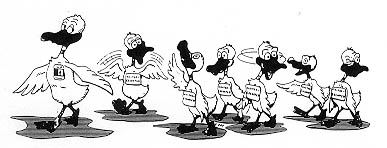
Transnational Conflict Prevention and Interdiction Programmes
Short-Term
Foreign Visitors
|
 |
| Escorts must be able to control visitors at all times. |
Creation of Embarrassing Incidents - When confronted about attempts to wander from the escorted party or to elicit information beyond the approved scope of the visit, visitors sometimes feign indignation and deliberately create an embarrassing scene. Too often, the host attempts to be conciliatory, giving the visitors opportunities to fulfill collection objectives. For example:
A foreign military representative was found to have been wandering away from his visitor escort. As a result, the president of the cleared facility confronted the foreign officer regarding this behavior. The representative responded by saying, "What do you think we are, criminals? Do you expect that we be escorted to the rest room?" The president responded by saying "Yes." The representative asked what authority the president has to require his being escorted. The company official said it was his facility and he was responsible for protecting government and proprietary information."7
Unannounced Changes to the Visiting Party - Last minute or unannounced changes to add personnel or substitute personnel may be an attempt to sneak an intelligence officer or technical expert (in a technical area that is not supposed to be a subject of the visit) into the visiting party.
Unannounced Visitors - Foreign military attaches frequently arrive at a defense contractor facility unannounced in a three-piece suit with a business card. The civilian business attire makes the military attaché appear less threatening to the facility personnel. The ploy is to arrive "unannounced" and rely on the courtesy of the company's management to permit the attaché access to the facility. On several occasions, and at separate facilities within the Washington, D.C. area, military attaches solicited unclassified papers and brochures and engaged in conversations to identify other sources of information. Company personnel may not have realized that most foreign military attaches are either trained intelligence officers or acting in the capacity of intelligence officers.
Arriving unannounced is particularly effective when the foreign visitor represents a company or organization that is negotiating for some kind of major business arrangement with the U.S. entity. The U.S. hosts have, at times, been reluctant to threaten a potentially lucrative sale by turning away visitors until a formal visit can be scheduled and required security arrangements made.1
Exploiting the Foreign Visits System - The U.S. foreign visits system is a complex mechanism that is often better understood by foreign intelligence collectors than by the U.S. companies that participate in the system. One way to exploit the system is to make multiple requests to different U.S. agencies. Another is to take advantage of different procedures depending upon whether the visit can be described as government sponsored, non-sponsored, or commercial in nature. For example, if a classified visit is disapproved, the foreign group may seek to arrange a commercial visit through a different U.S. Government agency. That's what happened in the following case:
Representatives of a foreign country attempted to schedule a classified visit to a cleared contractor. The responsible U.S. Government agency that must approve the foreign visit did not offer sponsorship. The same representatives made a second request through commercial channels to visit the same facility, but the request was denied because the visit required an export license that was not available. Several weeks later, several engineers in the company who worked on the technology the foreign representatives wanted to discuss started receiving faxes about a conference in the foreign country. Along with the conference invitation was an offer of three days of sightseeing.7
Exploiting Misinterpretations - U.S. personnel often fail to understand the limitations of government sponsored and non-sponsored foreign visits. For government-sponsored visits, the contractor personnel may be under the impression that any inquiry by the foreign visitor is legitimate. For non-sponsored visits, the fact that the U.S. Government did not forbid the visit and the foreign visitors forwarded security clearances may give the U.S. contractor personnel the mistaken impression that it is okay to discuss classified information.
Foreign Video Film Crews - Requests for foreign film crews to make documentary films are not uncommon, and a number of these requests have been quite suspect.
For example, a foreign film crew made a documentary on the U.S. biotechnology industry. As they did so, they systematically filmed all company documents that were made available to them in company after company. Said one company security chief, "They ran a vacuum cleaner over the U.S. biotech industry." Oddly enough, while cleared facilities often prohibit U.S. employees from bringing cameras onto the grounds, these same facilities all too frequently allow foreign video film crews into their facilities.5
In another incident, a foreign film crew requested and obtained permission to visit a U.S. firm to film a documentary on cancer research. While filming the video, the crew asked questions, collected information, and sought access to sensitive areas. It soon became obvious that the group possessed a technical understanding of the industry far beyond that expected of television professionals. Company technicians called Security, who escorted the crew from the facility.6
The following countermeasures are recommended:
Related Topic: Long-Term Foreign Visitors.
References
1. National Counterintelligence Executive.
Annual Report to Congress on Foreign Economic Collection and Industrial
Espionage - 2004, p. 6.
2. Most information is from Defense Investigative Service
brochure, Suspicious Indicators and Security Countermeasures for Foreign Collection
Activities Directed Against the U.S. Defense Industry, April 2003.
3. "CI Incident Log," Counterintelligence News and
Developments, November 1996, National Counterintelligence Center.
4. "Foreign Visits: What is Inappropriate?" Counterintelligence
News and Developments, September 1997, National Counterintelligence Center.
5. "Foreign Video Crews: A Multidiscipline Threat," Counterintelligence
News and Developments, November 1996, National Counterintelligence Center.
6. Rusty Capps, "The Spy Who Came to Work," Security
Management, February 1997.
7. James Norvell, "Assessing Foreign Collection Trends,"
Security Awareness Bulletin, Number 1-98, Department of Defense Security
Institute.
INFORMATION
| CONDUCT | THREATS |
TECH VULNERABILITY | ASSISTANCE
SPY STORIES | TREASON
101